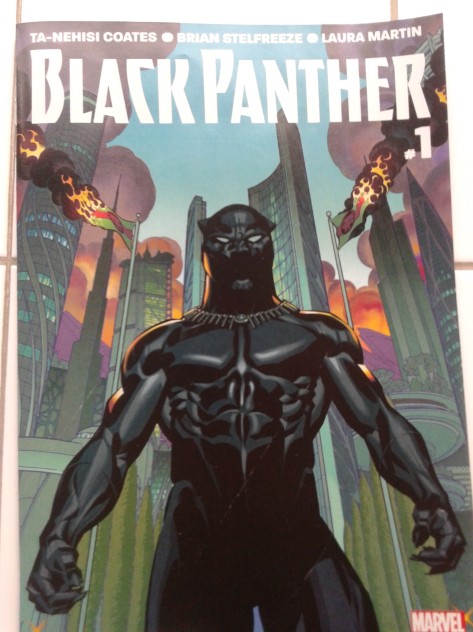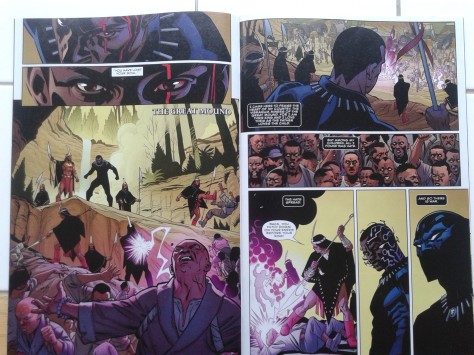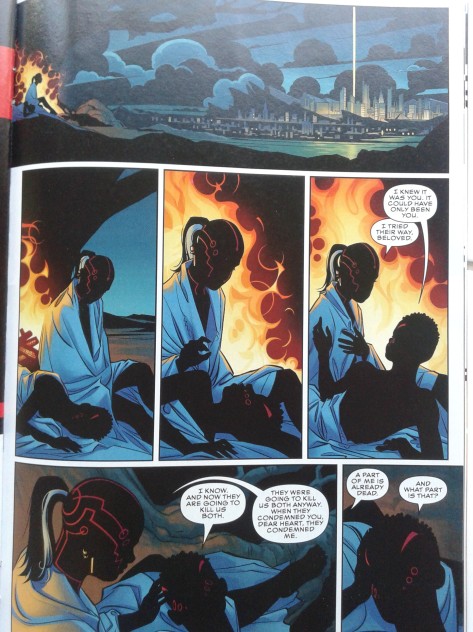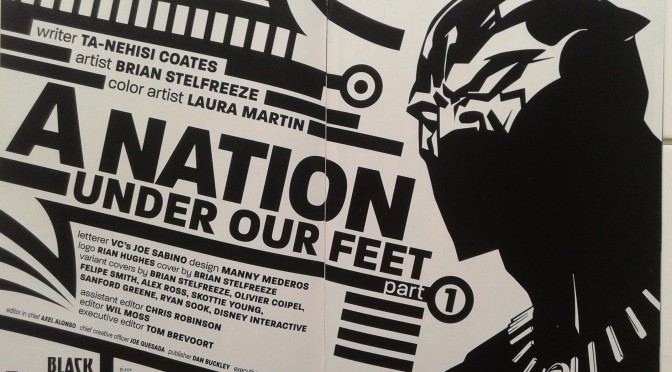(Get a load a that bomb-ass title page!!)
It’s been way too long. I think Batman v Superman got my superhero juices flowing again, but this comic really sealed the deal. Tuesday morning MPR aired a story about women and people of color in sci-fi/fantasy fiction, and they kicked it off by mentioning that Atlantic columnist, author, and all-around smart dude Ta-Nehisi Coates is relaunching Marvel’s Black Panther series.
I first encountered Coates in the interview segment of The Daily Show with Jon Stewart in July of last year, speaking about his new book Between the World and Me. This guy’s clearly got one hell of a journalistic acumen on him, but what really struck me about his comments and his writing at that time was his thoughtful, compassionate approach to the complexities of modern American life, especially at the intersections of race, social justice, and politics. The moment I heard Coates was writing a comic book, it took me only half a second longer to decide that I was going to buy that comic.

I’ve been craving some diversity in my comics lately, both in the creators and the characters. On that count, too, Black Panther delivers. The cast is entirely people of color, women, and even two characters of non-straight sexual orientation. Contrasted with the world of T’Challa, Batman v Superman‘s parade — or should I say funeral procession? — of angry, angsty white orphan boys feels almost unbearably dated, woefully behind the times. And while Marvel still stubbornly refuses to inject any genuine social or political commentary into their Cinematic Universe, they are killing DC in their representation of the diversifying faces of America.
Brian Stelfreeze (Shadow of the Bat, Domino) draws and Laura Martin (JLA: Earth 2, Universe X) colors the first issue of the relaunch. Let’s fix ourselves a Mustachio and talk about the comic!
The Mustachio
1.5oz Kentucky straight bourbon (I use Bulleit)
1oz Cointreau
.75oz Campari
.5oz lemon juice
lemon twist
Shake all ingredients over ice; strain to a rocks/Old-Fashioned glass. Garnish with a lemon twist and serve.
So “The Mustachio” is the closest recipe I could find to the drink I actually make, which goes 2:1:1 on the spirits and omits the lemon juice. I’ll be trying it with this recipe soon enough, but so far I’ve been mixing it my way because that’s how it was first served to me at Bathtub Gin & Co., a speakeasy in Seattle’s Belltown neighborhood. I’m not sure why the “official” recipe calls for lemon juice; it’s already got the sour element in the Cointreau, rounded out by the bitter and sweet of the Campari and bourbon. In any case, I’ve been meaning to write this one up for a while, and this is what I was sipping on while reading Black Panther #1.
(On the one hand, it’s too bad we’ll find no mustachioed villains in this comic. On the other — we know we can expect much better from Mr. Coates!)
Black Panther #1
This comic was a breath of fresh air for me. I was completely unfamiliar with T’Challa/Black Panther going into it, and while I’d say that hasn’t changed a whole lot in the pages of one comic, I really enjoyed reading a “new” character for the first time and being able to recognize the personal and emotional distances between T’Challa and me.
Anyway, I do know a little something now about Wakanda, the African nation over which T’Challa rules — or fails to rule, as it happens. As the comic opens, T’Challa has returned to govern his country after the death of his sister, Shuri, who had ruled in his stead while he was off Being a Fucking Hero or some such whatever. Wakanda is one of the most technologically advanced nations on Earth thanks to its large deposits of “vibranium,” the fictional metal from which Captain America’s shield, among many other Marvelous things, are constructed.

Well… the people of Wakanda ain’t pleased. In the comic’s first panel T’Challa has been clocked on the noggin by some kind of projectile — presumably a Rock, the patented projectile weapon of Angry Mobs everywhere — and his honor guard of dudes with magic laser-spears start shooting back. Turns out Laser beats Rock, and so does Black Panther. We’re meant to understand that the Angry Mob is under some kind of psychic influence, as indicated by the Angry Mob With Glowing Eyes Effect(tm). More on that later.
In this comic, T’Challa seems completely uninterested in being king of anything. Coates alludes to this in his NPR interview with Audie Cornish, explaining that T’Challa is “in a position where he felt committed to do certain things, but in his heart was really not there, it wasn’t really who he was.” Coates relates to his protagonist on this level, feeling as though other writers and thinkers have tried to turn him into the “one person everyone should go to to know about all things black.” It’s always promising when a writer feels some insight into their characters, like they can get inside their fictional heads.
But the similarities between writer and hero seem to end there. Where Coates is humble and thoughtful, T’Challa is brash and even a little arrogant. He narrates in archaic metaphors with a haughty, detached air of entitlement reminiscent of characters like Boromir in The Lord of the Rings or Leonidas in 300. This is no criticism of Coates’ writing — on the contrary, it further signifies that T’Challa is merely playing a part he didn’t ask for.
He’s really only interested in being a superhero: he jumps, he punches, he runs really really fast — and he gets pretty much nowhere, story-wise. Coates has created some compelling tension between “soldier” and “king,” to use the comic’s own words — the guy who leaps into the fray, and the guy who should look before he leaps. There’s a sense that T’Challa occupies a strangely conservative position in relation to the other characters and to his country; he has grudgingly accepted his role as king, but doesn’t want to adapt to that role and its responsibilities. He’s stuck in the past — to a rather extreme extent that I won’t spoil for you here.
Meanwhile, the supporting cast — Ayo, Aneka, Ramonda, all black women — set up some familiar questions around law and justice. The “psychic influence” on the people of Wakanda comes from a woman named Zenzi, who seems to be in league with a surprisingly large band of dissidents. Her motivations are unclear so far, but she occupies somewhat of a populist position in relation to the unilateral power of T’Challa/Black Panther. Wakanda seems to be headed for a conflict between a populace with legitimate grievances but questionable leadership, and a ruler with (more or less) absolute power who has little experience with ruling (and apparently no desire for it, either).
To be sure, these are all questions that the superhero genre has been asking for decades, but something about the setting, the characters and the artists in Black Panther #1 seems to promise answers we haven’t necessarily seen before. I’m really looking forward to the next issue — I feel like I can trust Coates to treat these questions and these characters with the complexity and care I’ve come to expect from him in other media.
 Brian Stelfreeze and Laura Martin are pulling their weight, too. Their collaboration really shines during an emotional moment between Ayo and Aneka, two of Black Panther’s elite royal guard. Stelfreeze draws the two women only as silhouettes while the light of a campfire dances behind them, and Martin’s coloring is bold, vivid without destroying the peace or intimacy of the scene. Coates’ dialogue is strong as always, but in these several panels the art leapt forward to perform the more meaningful storytelling.
Brian Stelfreeze and Laura Martin are pulling their weight, too. Their collaboration really shines during an emotional moment between Ayo and Aneka, two of Black Panther’s elite royal guard. Stelfreeze draws the two women only as silhouettes while the light of a campfire dances behind them, and Martin’s coloring is bold, vivid without destroying the peace or intimacy of the scene. Coates’ dialogue is strong as always, but in these several panels the art leapt forward to perform the more meaningful storytelling.
Go grab this comic! I’m totally on board with this team of artists and their cast of characters. I’ll definitely be picking up issue #2 on the day it comes out, too.
— A


